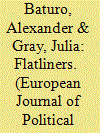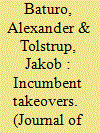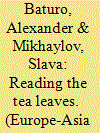|
|
|
Sort Order |
|
|
|
Items / Page
|
|
|
|
|
|
|
| Srl | Item |
| 1 |
ID:
086756


|
|
|
|
|
| Publication |
2009.
|
| Summary/Abstract |
What factors explain the wave of adoption of the flat tax in Eastern Europe? It is argued in this article that, once the first few successes were underway, governments with liberal outlooks toward taxation adopted the reform through a process of rational learning: an often radically new government will tend to adopt the policy based on successful implementation of its neighbours. The issue of policy diffusion is approached by explicitly modeling the different mechanisms that might underlie the process. Little evidence is found for pure 'bandwagoning' in the adoption of the flat tax - the presence of other market-minded reforms do not predict adoption of the flat tax, and contagion measures do not capture the dynamics of the adoption of the reform. Instead, rational learning, where economically right-wing governments evaluated the success of the reform (as measured by their ability to attract foreign investment) in the medium term, plays the largest role. Rational emulation in a shorter time period contributes to the probability of adoption as well, as does a change to an economically liberal ideology.
|
|
|
|
|
|
|
|
|
|
|
|
|
|
|
|
| 2 |
ID:
190847


|
|
|
|
|
| Summary/Abstract |
The expansion of power by incumbent political leaders has become the subject of increased scholarly attention. In democracies, this is known as ‘subversions by the ruling executive’, ‘executive aggrandizement’, or ‘autogolpe’; in autocracies, researchers study ‘personalization’, ‘transition to personal rulership’, or ‘power-grabbing’. While the terminological landscape is rich, there is little conceptual agreement of what leader-driven power expansion is (and is not). Furthermore, we still lack broad data that allow us to investigate the phenomenon systematically across democracy and autocracy. The contribution of this article is twofold. First, it offers a unified approach to study leader-driven power expansion – incumbent takeovers – across the political regime spectrum. Second, drawing from 11 datasets and original data collection and coding, we introduce a new, comprehensive dataset on 495 individual takeover events carried out by 279 political leaders in 132 countries in the period 1918–2019. We provide estimates of the takeover onset years, the time to takeover, the length of the takeover spells, and discuss the differences between distinct indicators, inter alia. Future research may leverage these data for a better understanding of the drivers of incumbent takeovers as well as the role of takeovers in regime change, civil wars, coups, and uprisings.
|
|
|
|
|
|
|
|
|
|
|
|
|
|
|
|
| 3 |
ID:
132944


|
|
|
|
|
| Publication |
2014.
|
| Summary/Abstract |
In the absence of public information on the inner workings of the Russian political regime, especially during Medvedev's presidency, outside observers often have to rely on politicians' unguarded comments or subjective analysis. Instead, we turn to quantitative text analysis of political rhetoric. Treating governors as a quasi-expert panel, we argue that policy positions revealed in regional legislative addresses explain how elites perceived the distribution of power between Putin and Medvedev. We find that governors moved from a neutral position in 2009 to a clearly pro-Putin position in 2011, and that policy initiatives advocated by Medvedev all but evaporated from the rhetoric of governors in 2012.
|
|
|
|
|
|
|
|
|
|
|
|
|
|
|
|
|
|
|
|
|